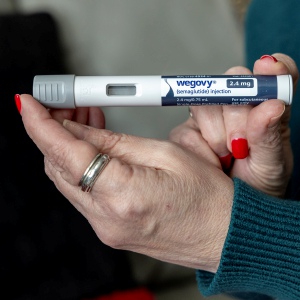Opinion: When the time nears, how and when I die should be my choice

John Reese, of Strafford, Vermont, is surrounded by paintings by his wife Deborah at his home on March 5, 2018. Deborah Reese, died of pancreatic cancer in 2016. She sought to have medical aid in dying, but died at DHMC before she could receive it. (Valley News - Jennifer Hauck) Jennifer Hauck
| Published: 02-06-2025 6:00 AM |
Steven Gordon of Hopkinton is Senior Counsel at Shaheen & Gordon.
The other day, I spent five hours at the State House listening to the testimony in support of and opposition to the passage of HB 254, The “New Hampshire End of Life Freedom Act.” The act affords individuals with terminal illnesses to access medical aid-in-dying. I, along with others, spoke in favor of the bill, and I listened intently to the opposition.
I believe that when faced with imminent death my personal autonomy in deciding how I die, whether it be painful or peaceful, sentient and surrounded by loved ones at home or drugged into a stupor in a foreign bed, is my decision to make without state interference. The state has no right to be in my death bed.
The End of Life Freedom Act does not impose itself on others. Anyone can ignore the law if they believe it to be flawed or immoral. No provider has to participate in the process. No fetus is involved. The only body impacted is the body making the choice. Only those who seek the freedom of the bill and meet its strict qualifications may apply and of those, between 30 and 40% do not take the prescribed medication. The knowledge that the medication is available, provides necessary comfort to the dying; the disease is no longer in total control of your body – a modicum of personal autonomy remains.
The thrust of the opposition was that the bill sanctioned suicide. Members of the disability community emotionally testified that the bill promotes suicide and will encourage those with disabilities to commit suicide, despite the lack of clear statistical evidence. With earnestness, they argued that the state must take full measure to minimize the risk of suicide amongst those who are vulnerable.
During the nearly five hours of testimony, the “slippery slope” of suicide was a constant refrain from those opposed to the bill; yet, ironically at least three persons testifying in support of the bill told their harrowing personal stories of a loved one, suffering from uncontrollable pain at the end of their lives, and without any viable option to their unrelenting trauma ended their suffering with a gun shot to the head. Their compound tragedies caused by these horrific endings compelled their testimony.
On the day following our hearing, another legislative hearing was held, again focusing on guns and suicide but from a different perspective. HB 56 mandates a waiting period of 72 hours before a transfer of firearms. The intent of the bill is to enhance public safety by preventing firearms from being acquired by individuals who are legally prohibited from owning them, such as felons and those with a history of domestic abuse or suffering from mental illness, including the heightened risk of suicide.
Testifying in favor of the bill was Donna Morin. She pleaded to lawmakers that a 72-hour waiting period on gun purchases could have saved her son. Spurred by a recent breakup, her son went to the gun shop close to their home and bought a firearm and shot himself. Morin testified, “If the law would’ve made him wait just a couple of more days – even 24 hours – he would’ve been able to make a rational decision if he wanted to really end his life.” In 2022, New Hampshire had 156 gun deaths. Of those, 134 were suicides.
Article continues after...
Yesterday's Most Read Articles
A brief waiting period between the purchase of gun and its possession by those tottering on suicides edge, promotes the value of life; yet, it does not appear that those who opposed the End of Life Freedom Act found any problem with putting firearms immediately in the hands of those who are at risk of imminent suicide.
If NH is genuinely concerned about suicide prevention it should fund suicide prevention programs and place reasonable restrictions on gun access, not prohibit end of life decisions. If my medical condition satisfies the rigid standards of the End of Life Freedom Act, the state has no business interfering with my personal choice of how and when I die.







 Opinion: An attack on the legal profession is an attack on us all
Opinion: An attack on the legal profession is an attack on us all Opinion: HealthTrust's decision to drop anti-obesity medications is a step back in the fight against a chronic disease
Opinion: HealthTrust's decision to drop anti-obesity medications is a step back in the fight against a chronic disease
